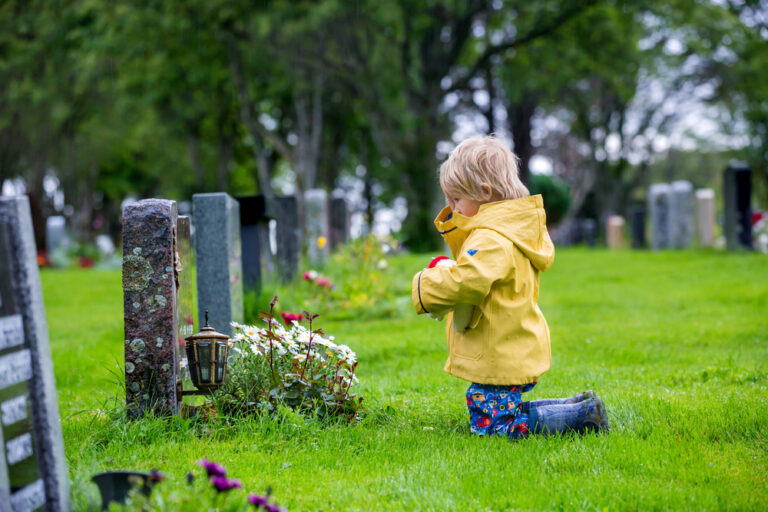As is often the case, my family lost several grandparents and great grandparents within a few years of each other. When my son was four, my last living grandparent, Grandma Evelyn, passed away. When I told my boys that she had died, my four-year-old shook his head, sighed and said, “We’re running out of Grandma’s”. I giggled through tears, knowing that my Grandma would have loved that cute little boy quip. This is an example of a matter of fact way that a four-year-old might view loss.
How should I talk to my kids about death and dying? How can I help them cope with grief and loss? Should we bring our children to visit a loved one before they pass or will that be too traumatic? As a hospice social worker, these are questions I often hear families grapple with. When adults are dealing with the loss or anticipated loss of a loved one, they often struggle with how to help their children cope as well.
There are no right or wrong answers here. When making decisions like this, it is important to take your child’s personality into account. Is your child extra sensitive or super shy? Are they the type who will hold things tightly to themselves, or is your child one that never leaves you wondering what they are thinking or feeling?
It is a good idea to be open and honest with children and to answer their questions on a level that is age appropriate for them. However, you may not want to overload them with too much information.
If you have a quiet, introspective child, you may need to bring up the topic, to let them know it is okay to ask questions. Kids take things literally so be sure to answer their questions and listen as they talk; this may help you understand their perception of the situation. Be open and share stories and memories of your loved one.
Let them know it is okay to talk about the one who has passed away, even though people may seem sad. A friend of mine lost his grandfather when he was a little boy – they were very close and loved to do things together. After his grandfather passed away, the family never spoke of him. It was as if all memory of him had vanished. In trying to protect him, they did not give him a chance to grieve openly, to ask questions, to cry or to share sweet memories. It was not until he was an adult that he was able to fully grieve that loss.
Keep in mind that often times children may not understand or have the words to describe how they are feeling. Instead of telling you that they are worried, upset, or sad, they may express it in their behaviors. They may act out, appear irritable with peers, get into arguments with siblings, get in trouble at school or become tearful or extra clingy.
Children are concrete thinkers and they may somehow feel it is their fault that their grandparent or loved one is sick or dying. Some children may become extra-vigilant with their schoolwork or chores at home, perhaps thinking that if they are on their best behavior, they can make their loved one better again. In a child’s ego-centric world, this is their way of trying to maintain control.
There are several ways you can help your child during this process. One is to reassure them that this loss is in no way their fault. You can get a Feelings Chart or emotion flash cards that can teach kids the names of emotions with pictures and words. Thus, learning how to express and understand what they are going through.
Another suggestion is bibliotherapy. There are numerous children’s books about death, loss and grief. This is an excellent, non-threatening way to normalize loss for a child. They can read about other families’ experiences and understand that they are not alone. They say a child’s work is their play. Children will often work out their grief through pretend play, coloring, drawing, and telling stories. You can find free printable worksheets online to help guide your conversations about grief.
If your child is attending school, be sure to let their teacher and school counselor know what is going on in your family so they can be aware of any concerns and offer additional support when your child is having a difficult day. In our town, we have an amazing resource called The Grief Center. They offer individual and group counseling as well as summer camps for kids who are dealing with loss. Don’t hesitate to reach out to experts for help. Many churches and religious organizations also offer grief support.
A great way to honor the memory of your loved one is by doing a Legacy Project for or with your child. There are so many creative ways to do this. Some people make scrapbooks, shadow boxes and photo albums or video tributes. Others may plant a tree in their honor. Having a grandparent record themselves reading a favorite story book is another cherished item.
Take a photo of your child and their loved one holding hands or sharing a hug or a kiss. Make a special blanket or teddy bear out of the flannel shirts that grandpa used to wear. Give the child something that was special to their grandmother. There are a myriad of ways to do this and it provides a tangible memento for the child to treasure for years to come.
Finally, don’t forget to take care of yourself. After all, your child is not the only one grieving. It is okay for children to see you cry and to talk about how you also miss your loved one. Teach them what helps you get through the hard days – maybe it’s your faith in God, reaching out to a close friend, or spending quiet time in nature. This will provide your child with a healthy example of how to cope with loss. Give yourself and your family grace for the tough days and time and space to grieve and heal.






